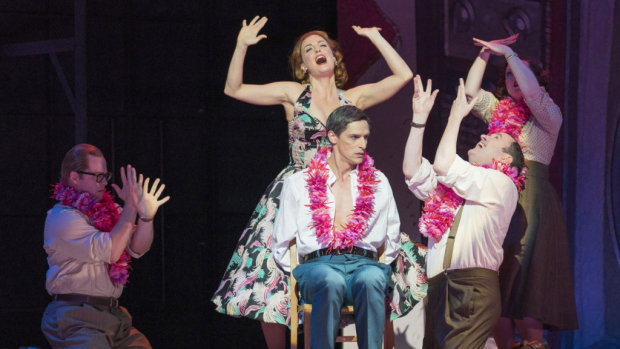Review: Little Greats [Part 1] (Leeds Grand Theatre and tour)
Revelations and rediscoveries in Opera North’s scintillating tour of six one-act operas

© Alastair Muir
While Osud is the main attraction for anyone thirsting after new sensations, the biggest surprise in Opera North‘s season of Little Greats is Leonard Bernstein’s bleak one-acter about a loveless marriage in suburban America, Trouble in Tahiti. This seldom-performed miniature offers a poleaxing 40 minutes of psychological truths mercilessly laid bare, and Tobias Ringborg and the Opera North Orchestra play the jazzy hell out of it.
The title refers to a fictitious B-movie, an exotic musical where romance blossoms and everyone’s life is free-'n'-cheesy. Dinah (Wallis Giunta, magnetic) watches it one afternoon as a refuge from her empty existence with money-loving husband Sam (Quirijn de Lang, ditto). He has a date on the handball court after work, so neither of them goes to support their son in his school play.
That’s about it for plot, but this 1952 piece is startlingly good – taut, compelling and nerve-bristling – and is directed with a sure sense of style by Matthew Eberhardt. A swing-jazz-blues trio (the excellent Fflur Wyn, Joseph Shovelton and Nicholas Butterfield) comments on the action in a device that Cy Coleman would later emulate in City of Angels, while the two principals lay bare their souls through interior monologues of a melancholy beauty that anticipate the composer’s later works, especially his hippified Mass.
Bernstein’s libretto, his own, does that thing he regularly did of treading a tightrope between cloying and crystalline, nowhere more so than in Dinah’s soliloquy (musically redolent of Samuel Barber’s Knoxville: Summer of 1915): "There is a shining garden, come and see. There love will teach us harmony and grace. Then love will lead us to a quiet place."
Those last three words would become the title of Bernstein’s 1983 sequel, worth exploring if you want to learn more about this miserable couple. But leave that until you’ve properly digested the little miracle that is Trouble in Tahiti. Meanwhile, here’s some neglected Janáček.
'A trio of five-star operas'
Osud (meaning Fate or Destiny) is a tricky opera to programme, which may account for the fact that there have only been 13 accredited productions of it worldwide in over a century. At 80 minutes it is more than half an evening but a crucial shade shorter that a whole one; From the House of the Dead and The Cunning Little Vixen may each run only ten minutes longer, but that’s been just enough to allow them to stand alone.
Like Dinah and Sam, the composer Živny has a tricky marriage. He’s devoted more to his music than to his wife, Mila, a fact that engenders chagrin in his son and vituperation in his mother-in-law. Živny’s writer’s block has left him unable to complete a commissioned opera, and only when life itself takes an operatic turn does his creativity take wing once more – but at an unimaginable cost.
Annabel Arden‘s production is fluid and free, ideally responsive to the opera’s Technicolor orchestrations (spectacularly well played under Martin André‘s baton) so that even the laying of a tablecloth is energised by Janáček’s scoring. The cast is exemplary: tenor John Graham-Hall plays Živny with more than a tinge of Britten’s Aschenbach, another tortured artist, while Giselle Allen and Rosalind Plowright are on searing form as Mila and her mother. With cameos from Ann Taylor, Peter Auty and Richard Burkhard at the head of a large cast and chorus, it’s a haunting piece and a worthy successor to the composer’s previous success, Jenůfa. Who knows, an extra ten minutes’ running time might have made all the difference to Osud‘s destiny. But that’s fate, I guess.
All six Little Greats have been designed by Charles Edwards and share both a common aesthetic and many of their scenic elements. For atmosphere alone, it’s L’Enfant et les sortilèges (The Child and the Spells) that sees the best of him, with walls that come and go and household furniture that comes to life.
Wyn, Taylor, Graham-Hall and de Lang all turn up again in Ravel’s short masterpiece along with several other leading British artists (most singers this season are in two of the six shows; the splendid Wyn is in three), but it is Giunta once more who holds the stage in a beautifully vulnerable portrayal of the naughty boy who learns to be kind. The Canadian mezzo is class personified.
L’Enfant may be less of a revelation than the other two works, in that it is already a familiar visitor to the opera house, but Annabel Arden and Martin André treat it like new cloth and fashion magic from its slender resources. It completes a trio of five-star operas in this imaginative autumn tour, and that’s a wonder in itself. Little Greats indeed.
Opera North's season of Little Greats tours to Hull, Nottingham, Newcastle and Manchester until 18 November.













